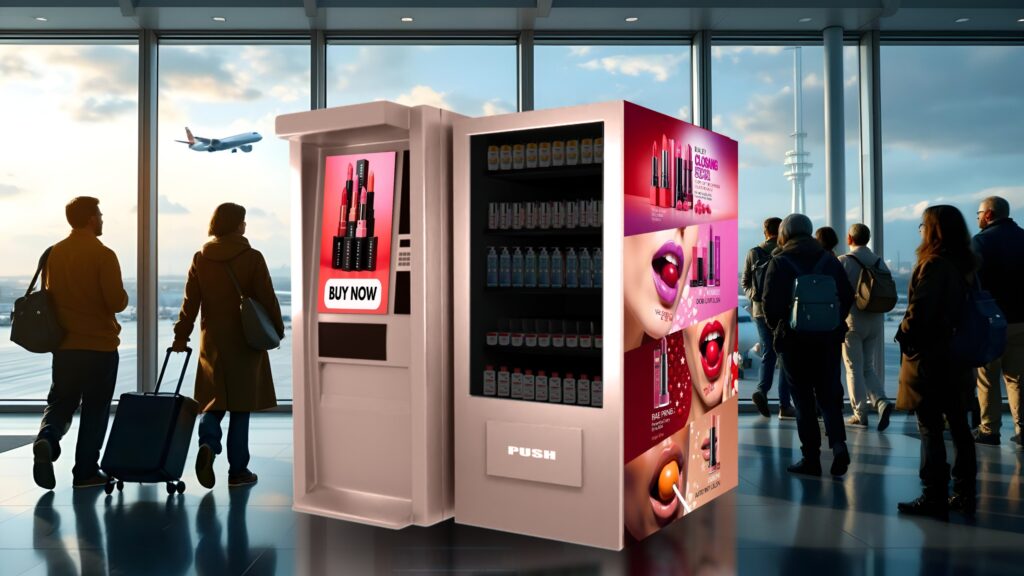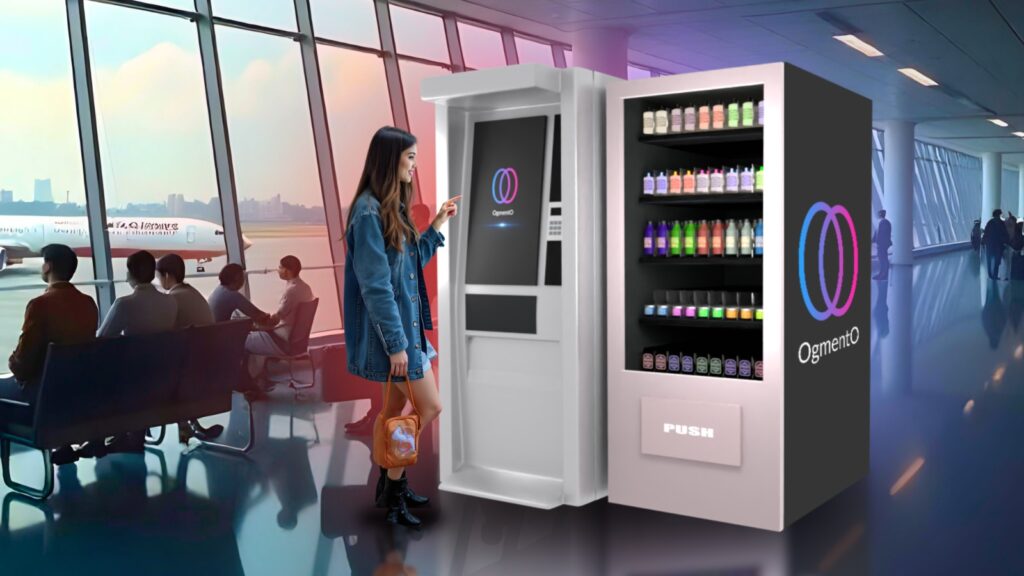The beauty sector is seeing a surge in D2C brands catering to today’s on-the-go, tech-savvy travellers. These consumers want quick, convenient access to their favourite products right within the transit hubs they move through.
Previously limited to online sales, D2C brands struggled to capture impulse purchases in airports and other high-traffic zones. Smart vending machines have changed that — offering 24/7 access to travel-size cosmetics and skincare through sleek, intuitive kiosks. Whether it’s a mini makeup kit before takeoff or a skincare pack mid-journey, these machines bring beauty to the boarding gate with speed, style, and visibility.
The Rise of D2C Beauty in Travel Retail
Global beauty brands like Sephora, Glossier, and Kylie Cosmetics are tapping into the rising potential of travel retail by extending their presence beyond traditional stores. From airport pop-ups to smart vending machines, they’re creating new touchpoints to engage travellers — a high-intent audience with time to explore and spend. These formats help bridge the gap between digital-first loyalty and physical-world discovery.

In India, the airport travel retail segment is valued at approximately USD 1.45 billion in 2024 and is projected to grow to around USD 4.5 billion by 2032. As airports expand and modernise, smart vending offers D2C beauty brands a low-risk, cost-effective way to enter premium offline spaces, localise offerings, and capture impulse sales. With offline visibility boosting online traffic by up to 37%, vending machines are quickly becoming a strategic growth lever in India’s evolving retail ecosystem.
A similar shift is visible across other experience-led categories. In travel, brands like Travel Coffee, a Himalayan-born travel company, show how offline presence and trust-led storytelling can meaningfully drive digital discovery.
Simply put, travel hubs are the new battleground for D2C beauty; and smart vending machine is a sleek, scalable way to join the race.
How Smart Vending Machines Enable Travel Retail Innovation
Smart vending is the new stage for beauty — bold, tech-forward, and built for impulse discovery in travel retail.
But, there’s more to how smart vending machines are enabling travel retail innovation –
- 24/7 Convenience & Contactless Shopping: Smart vending machines operate 24/7 with interactive touchscreen displays and support multiple digital payment options, including UPI, Google Pay, and contactless cards. Designed for seamless convenience, they eliminate queues and expand access by offering multilingual interfaces — breaking language barriers and opening up sales to a wider, more diverse audience.
- Strategic High-Footfall Placement: These automated kiosks are installed in airports, train stations, malls and hotel lobbies; exactly where travellers congregate. Placing machines at gates or in transit areas attract more eyes on the brand making way for impulse purchases.
- Integrated Digital Experience: Smart vending machines blend automation with personalisation. They use intuitive digital catalogues and accept loyalty codes or coupons, often integrating with airline or hotel loyalty schemes as well.
They can also recommend products based on real-time data; for instance, the machine may suggest an after-sun lotion to a traveler who just bought an SPF 80++ lotion; or upsell a matching lip gloss to go with a previously purchased lipstick. Many smart kiosks also offer trial-sized product samples, effectively turning traditional sampling programmes into instant purchases.
Every vending interaction generates real-time data including tracking trends, preferences and peak times, allowing D2C brands to remotely optimise inventory, personalise marketing and deliver a seamless, traveller-friendly shopping experience.
Benefits for D2C Brands Using Vending Machines for Travellers
Smart vending machines let D2C beauty brands travel light, cutting costs, turning heads and tracking every sale along the way.
- Lower Operational Costs: Unlike a brick-and-mortar store, vending machines deflect high rent and staffing costs, making it a cost-effective way to establish a physical presence. Brands can pilot premium locations (like airport lounges or luxury hotels) without a huge investment, yet maintain a strong brand presence.
- Faster ROI: Vending machines bring in faster ROI compared to physical stores, owing to lower operational costs and their strategic placements in high footfall areas exposing the brand to potential buyers with sizeable disposable incomes.
- Enhanced Brand Visibility: Smart vending machines act as eye-catching billboards. Their large display screens can stream targeted ads, feature new launches or run special promotions. For example, Kylie Cosmetics’ fully branded vending units became 24/7 billboards at Las Vegas and New York airports.
Even without a conventional shop environment, the kiosks can successfully anchor the brand’s image in customers’ minds.
- Real-Time Data & Stock Control: Thanks to advanced technology integrations, smart vending machines can track and record every single sale instantly, giving D2C brands granular analytics on who buys what, when as well as their average expense.
They learn which airport travellers prefer skincare to makeup, or which duty-free aisle sells out first. This data enables targeted restocking, keeping high-demand items aways available and adjusting ranges for each location.
- New Market Testing: Vending machines allow brands to test concepts and locations. A single kiosk in a university or event can gauge interest before launching a permanent counter. This flexibility helps D2C firms expand gradually; for example, many brands mention deploying kiosks in Tier 2 and 3 cities with minimal risk before making a physical store lunch.
Real-World Examples – Beauty Meets Motion
Innovative D2C beauty brands are tapping into the travel rush by strategically deploying smart vending machines at high footfall travel hubs, meeting consumers where they are.
Kylie Cosmetics (USA): In 2019, Kylie Jenner launched vending machines at Las Vegas McCarran, JFK, and Philadelphia airports, stocked with her Lip Kits and eyeshadows. These machines doubled as 24/7 stores and brand billboards, boosting visibility and convenience.
Essie (USA): At JFK and Oakland airports, Essie’s “Colour Boutique” machines offered 48 nail polish shades for $8.50 each. With application guides and fun packaging, the kiosks turned beauty touch-ups into quick, colourful impulse buys.
Benefit Cosmetics (USA): Benefit’s “Glam Up & Away” kiosks appeared in 25+ US airports, featuring 30 top products and playful tips. Their signature pink, bus-style design made terminals more engaging, while reinforcing the brand’s fun and quirky identity.
Smart Retail, Smarter Solutions – Navigating Operational Realities with Innovation
Expanding into high-traffic zones through smart vending brings real operational demands — from securing products and managing restocks to maintaining uptime and accessing premium locations. Vending partners are solving these issues with scalable, tech-led solutions built for real-world retail environments.
Tamper-proof designs and CCTV address security. Real-time inventory tracking and local fulfilment enable efficient replenishment. Remote diagnostics and updates reduce downtime and ensure a seamless user experience.
As for premium placement in airports and hotels, collaborations with vending tech providers simplify the negotiation and setup process. With the right support and systems, even small brands can scale confidently in high-traffic zones, no baggage attached.
Automated Beauty Retail: The Future of On-the-Go Shopping

Smart vending is quickly becoming a staple in beauty retail, transforming how D2C brands connect with travellers. Today’s machines are more than product dispensers — they’re tech-enabled, unmanned shopfronts built for convenience, discovery, and brand storytelling.
Tech-driven virtual skin analysis tools offer personalised product recommendations through facial scans and quizzes, mimicking in-store consultations. Large interactive touchscreens host tutorials, gamified experiences like spin-and-win, and bundle suggestions, encouraging impulse buys and cross-selling. Travel-ready packaging — TSA-compliant, refillable, or holiday-themed — adds to their appeal, making smart vending a perfect blend of utility and engagement.
What’s Next for D2C Beauty in Travel Retail
Looking ahead, the landscape is expanding beyond airports into train stations, malls, hotels, fitness centres, and even events like music festivals, sports arenas, and cruise ships — redefining what qualifies as a “travel zone.”
Future-ready features like AR try-ons, predictive AI, and real-time IoT tracking are already in pilot phases. Loyalty integrations may soon allow travellers to use airline miles or hotel points directly at kiosks, merging retail with the broader travel ecosystem. With Gen Z and Millennials driving demand for immersive, tech-forward experiences over traditional duty-free shopping, smart vending machines are poised to lead the next wave of beauty retail innovation.
Conclusion
Automated retail kiosks are no longer a novelty. They’re a game-changing channel for D2C beauty brands to meet travellers with convenience, brand storytelling, and on-the-go access. As travel rises and competition intensifies, early adopters will gain the edge in visibility, engagement, and global reach.
Are you a D2C beauty brand looking to expand your reach? Consider smart vending as your next retail frontier.

